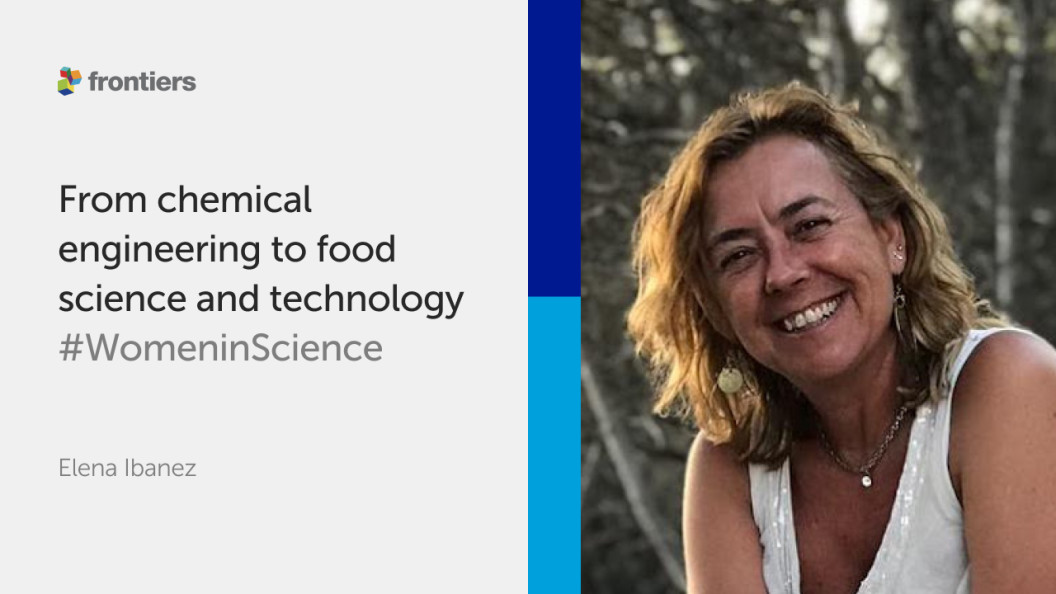- Science News
- Frontiers news
- Elena Ibanez – From chemical engineering to food science and technology
Elena Ibanez – From chemical engineering to food science and technology
Author: Leticia Nani Silva
Prof. Elena Ibanez is the Specialty Chief Editor in the journal Frontiers in Nutrition. Elena is a research professor at the Institute of Food Science Research in Madrid, Spain. Her work focuses on food engineering and food technology of new functional foods for human health. In this conversation we discuss her career, her passion as a professor and her incredible relationship with her students. Elena and I also go on to discuss the importance of nutrition research and how nutrition is at the heart of everything we do and how it affects our economy, our wellbeing, and, most of all, our behavior as human beings.

Prof. Elena Ibanez. Image Credit: Alba Bermudez
We start off by discussing the topic of aspiration and whether Elena has always wanted to be a researcher and a scientist. For Elena, laboratory work has always been her main passion, however, as the years went by, tasks became more demanding outside of the laboratory, such as writing research papers, grants, teaching and mentoring.
“Your responsibilities change over time, and it’s all part of the growth. One of the main drivers as to why I remain in this career is the passion I have for the continual learning experience.”
For Elena, science is all about constantly learning different concepts, regardless of whether they are within her immediate field of study or those academic disciplines adjacent to her work.
Having a chemical engineering background, I was curious to understand what her motivations were for moving into the area of food science. Although there are similarities between the two subjects, there are also massive differences in the way that research is carried out.
For Elena, her motivation came from working in a food and technology institute. Over the years, she transitioned through analytical chemistry, food science, and chemical engineering while trying to incorporate them all into her studies.
In our discussion we see how much merging there between different fields of science. I am a biologist, with a background in Neuroscience and Nutrition, however, most concepts that are involved in Chemistry are used within the fields that I studied as well. Chemistry is at the heart of a lot of the scientific fields and a lot of the concepts that are applied in Analytical Chemistry or Chemical Engineering are easily transferable into the food science industry and food sector. The bridge that links all of these subjects is much shorter than we think.
Food technology - are we at a turning point?
Elena and I discuss whether right now we are at a turning point or at a crossroads with food science technology. We discuss the concept that food science technology is really at the heart of everything we do, and yet a lot of people do not recognize this link or this importance.
“Nutritional science is part of the way that we consume our food, manage our health, but also control our economy and manage our finances across the world. It is applied both on a micro and macro scale.”
Elena considers sustainability as the main challenge in food science right now. One of the main topics Elena pushes in her work is the use of underutilized biomasses or food waste in order to generate a more sustainable circular economy.
“It is important to put science at the top in order to face challenges and future pandemics in an intelligent way. There is still so much to do in terms of making sure that science climbs up the ladder of importance in specific countries.”
As a woman in science
For Elena, science was always her dream and it was not very difficult for her to choose what she wanted to study. However, the challenge came from the ratio of female students within the field of Chemical Engineering. Only a third of students in her course were female. She faced challenges coming back to Spain after having completed her 2-year postdoc in the USA. Finding a permanent position was tough and it took a while to find her feet, especially as she mentioned she was getting to an age where her priorities were changing in terms of starting a family, whilst also continuing to grow her academic careers.
“It is completely different for men and women who are applying for permanent positions. When a woman gets to a certain age, the biological clock starts ticking; whereas for men, no such clock exists. Even when time is divided between being a mother and a researcher, finding the right balance between building a strong reputation in your new role and also giving your children and family the support they need is really demanding on the career and life progression of a woman.”
Elena comments on the fact that she has been very lucky in her career to have progressed so far. However, she understands that for women the career mountain seems a little further to climb and also there are many more obstacles and stops along the way that slow down career progression until the summit is reached.
We talk about motherhood and the importance of progression within this area. For myself, I do plan on being a mother one day and as a working woman in science, it is important that my profession accommodates this as well and that I am able to progress in the same manner as my male counterparts. I believe, opportunity should be available to everyone, regardless of maternity leave or not. It is a subject that is commonly discussed in our blogs and within our communities, and thus needs to be raised constantly so that female scientists can continue to have that same drive and passion for their roles, without having to slow down or even compromise their end goal. Better solutions have to be brought to the table for discussion at a higher level.
Science mentoring and life coaching
Elena and I discuss the advantages of being a mother and how this helps within the academic community. When one becomes a new parent, some pretty useful transferable skills come into play. Elena mentions that with her students, she feels partially responsible for checking in on them and making sure that she can be there for them, not only as a mentor in the laboratory, but also as a coach outside the classroom. As the most senior staff member in her team, and the only woman, she has taken on the role as the ‘mother of the group’. Elena approaches her students with a warm but assertive attitude, making sure that the work gets done to the best of their abilities, but also at the same time making sure that everyone is happy and there is a good level of mental health being promoted within the group at all times, as most of the students are not necessarily from the country they are studying in.
Encouraging more women and girls into the scientific workforce
“This is a difficult question. The scientific community has to focus on promoting science, and not just to men. There needs to be more investment in its promotion to women, and from an early age. There needs to be constant encouragement and also continuous support even after university. Women are not less than their male counterparts and can do the same role/job in the same setting. However, there needs to be encouragement, support, and guidance from the get-go.”

Frontiers is a signatory of the United Nations Publishers COMPACT. This interview has been published in support of United Nations Sustainable Goal 5: Achieve gender equality and empower all women and girls.








